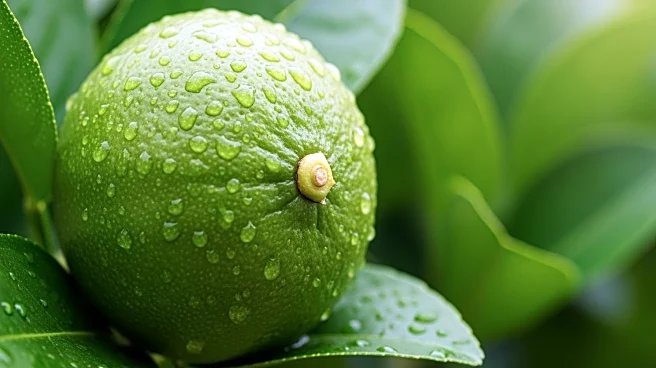What's Happening?
BASF Aroma Ingredients has introduced a new product, Isobionics® Natural alpha-Farnesene 95, to its portfolio of natural flavor ingredients. This new addition is specifically designed for lime applications
and boasts a purity level exceeding 95%. The product is derived from renewable resources through fermentation, ensuring consistent availability regardless of weather or harvest conditions. It is compliant with both EU and US food grade regulations and is certified as natural, pesticide-free, kosher, halal, and FSSC 22000. The flavor profile of Isobionics® Natural alpha-Farnesene 95 includes a vegetable odor with notes of celery, plant stem, and fruit skin, and a taste that combines floral, waxy apple/pear skin, citrus, and white flower elements.
Why It's Important?
The launch of Isobionics® Natural alpha-Farnesene 95 represents a significant advancement in the flavor industry, particularly for lime applications. By offering a high-purity, natural ingredient, BASF is catering to the growing demand for sustainable and reliable flavor solutions. This product not only enhances the flavor profiles of lime essential oils but also broadens the possibilities for use in beverages, sweets, and other citrus and fruit flavor formulations. The innovation aligns with industry trends towards natural and environmentally friendly products, potentially setting a new standard for flavor ingredients.
What's Next?
BASF is inviting customers to experience the high purity of Isobionics® Natural alpha-Farnesene 95 through exclusive demonstrations or by ordering product samples. This initiative is likely to foster greater adoption of the ingredient across various sectors, including food and beverage industries. As the product gains traction, it may prompt competitors to develop similar high-purity, natural flavor ingredients, further driving innovation in the market.
Beyond the Headlines
The introduction of Isobionics® Natural alpha-Farnesene 95 could have broader implications for the flavor industry, particularly in terms of sustainability and resource management. By utilizing fermentation technology and renewable resources, BASF is reducing dependency on traditional agricultural methods, which are often subject to environmental and climatic challenges. This approach not only ensures a stable supply chain but also supports global efforts towards sustainable production practices.










